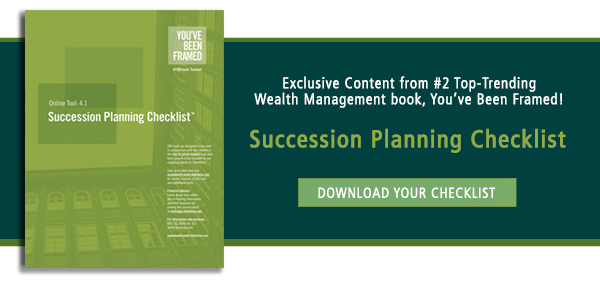When’s The Right Time to Sell Your Business?
 A mere 3% of today’s advisors have a written continuity plan to protect their business (and more importantly their clients’ best interests) in the event of their death or disability. Fewer than one in three (31%) advisors age 60 or older have a formal written succession plan in place. For a profession that prides itself on planning and preparing clients for the future, most of you are doing a pretty horrible job when it comes to planning your own.
A mere 3% of today’s advisors have a written continuity plan to protect their business (and more importantly their clients’ best interests) in the event of their death or disability. Fewer than one in three (31%) advisors age 60 or older have a formal written succession plan in place. For a profession that prides itself on planning and preparing clients for the future, most of you are doing a pretty horrible job when it comes to planning your own.
Over the next decade nearly 70,000 advisors will be looking to retire. Yet, given the present state of the industry, my strong inclination is to invest heavily in oxygen tank manufacturers because it certainly seems as though most of you are going to end up dying at your desks unless things drastically change.
How many of you have cautioned clients over the years about the hazards of becoming emotionally attached to their investments, urging them to act rationally and dispassionately as the market and circumstances dictate?
Can you honestly say you’ve heeded that advice when it comes to your own largest asset – your business? There’s no question it’s an extraordinarily difficult challenge. Given all the time, effort and years of your life that you’ve devoted to your business, the thought of selling it can feel more like abandoning a child or severing a long marriage.
But think about it for a moment and tell me which you would prefer:
-
to begin transitioning out of the business at age 60 when both you and your clients are in good health, net AUM growth is still positive and you’re still fully engaged in the business; or
-
to wait until you’re 70 with significant health issues, slowly watching assets bleed away as clients die and their heirs go elsewhere, while both your desire and ability to gather assets diminishes.
An aging client base means diminishing business value
The average “sweet-spot” client for most advisors tends to be wealthy individuals or families that are typically about 5-10 years older than the advisor. That means by the time most advisors consider selling their business, the vast majority of their clients are already well into retirement, depleting assets through income distributions at a far more rapid pace than new client acquisitions can offset. The resulting negative cash flow is a clear red flag for any potential buyer.
Nobody but you can determine when it’s the right time to sell. It’s a highly personalized and emotionally-charged decision. But the data is crystal clear in one respect – the longer you try to hold on to the reins, the less value you’re going to extract from your life’s work. Given the growing trend for sellers to remain engaged longer with their firm before transitioning out of the business, a 60-year old advisor could sell their business tomorrow at a significant premium to what they might get by waiting until age 65, and yet they could still remain actively involved in the running of the business for the next five years.
Coaching Questions from this article:
-
What do you want as a final outcome for your own retirement as well as the future of your business?
-
What steps have you taken to develop a viable succession plan? If an internal sale is planned, are there funding mechanisms in place?
-
In thinking about your promise to care for your clients throughout all of life’s transitions, when do you think it would be in their best interest for you to begin talking with potential buyers?


